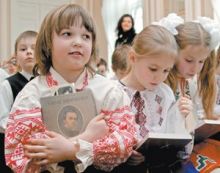It is perhaps for the first time in history that Knowledge Day was marked in Ukraine by protests against the education minister’s policies. Since he assumed the office of Minister of Education, Science, Youth, and Sport, Dmytro Tabachnyk has provoked conflicts in almost all the important educational fields: it is curtailment of external independent testing, reduction of the role of self-government, the intention to cut the number of universities, a new wording of the law on education, the closure of educational institutions, and reduction of the governmental quota (especially at the Kyiv Mohyla Academy), not to mention the gibes against his “beloved” western Ukraine or US policies towards Ukraine. Yesterday Mr. Tabachnyk announced good news: according to a survey of education development held at the request of the Davos World Economic Forum, Ukraine ranks 56th, Poland 64th, and Russia 72nd (he actually said “we are the 72nd,” but this slip of the tongue is for psychologists to judge).
What caused the greatest stir in society were his statements about the possibility of choosing the language of instruction in schools at local levels, as well as closure of Ukrainian-language schools in Donetsk city and Donetsk and Luhansk oblasts. Appearing in an Inter TV channel live program, the minister thus expressed the idea that local authorities are authorized to allow choosing the language of school instruction: “Ukraine’s law on education and general secondary education sets out clearly that parents and children have the right to choose the language of instruction – not only Ukrainian and Russian at that,” he noted. “If parents consider it necessary and there is lack of possibilities, the petitions of 15 parents will be enough to open a Hungarian class in one school or a Russian class in another. Under the law, secondary education is the preserve of the local authorities, i.e., district and local councils, city and village mayors. So they are obliged to meet the demands of their territorial community about the education these people have chosen. If the local territorial government in Odesa, Kremenchuk or Poltava has made a decision on the type of their schools and classes, it is their natural, human, European, and lawful right,” Tabachnyk said.
Even the European Association of Ukrainians is concerned over the Ukrainian identity situation. “The Ukrainians who live abroad are finding it increasingly difficult to preserve their identity.
While Russia is pursuing an active policy aimed at assimilating the Ukrainians, Ukraine is still to formulate an official policy towards its foreign compatriots,” Oleksii Tolkachov, president of the European Association of Ukrainians, told UNIAN. He compared Ukraine’s attitude to the way Russia is tackling this problem: “The Russian law considers all people born on the former USSR’s territory as compatriots. They consider Ukrainians abroad as compatriots of the Russians. Russia is pursuing an active policy: they hold concerts, organize games, contests, cultural events, and leisure. Moscow is channeling enormous money into this.”
But what is the use of speaking about the preservation of Ukrainian identity abroad if Ukraine itself is carrying out a policy that dissuades the Ukrainians from identifying themselves with Ukraine? Here is the result of our inferiority complex: when pollsters ask our people what language they speak at home and at a public place, 53 and 44 percent say they use Ukrainian and Russian, respectively, at home. This means I identify myself as a Ukrainian at home, but who am I in public then? For a school, a daycare facility, and a higher educational institution is a public place, isn’t it?







